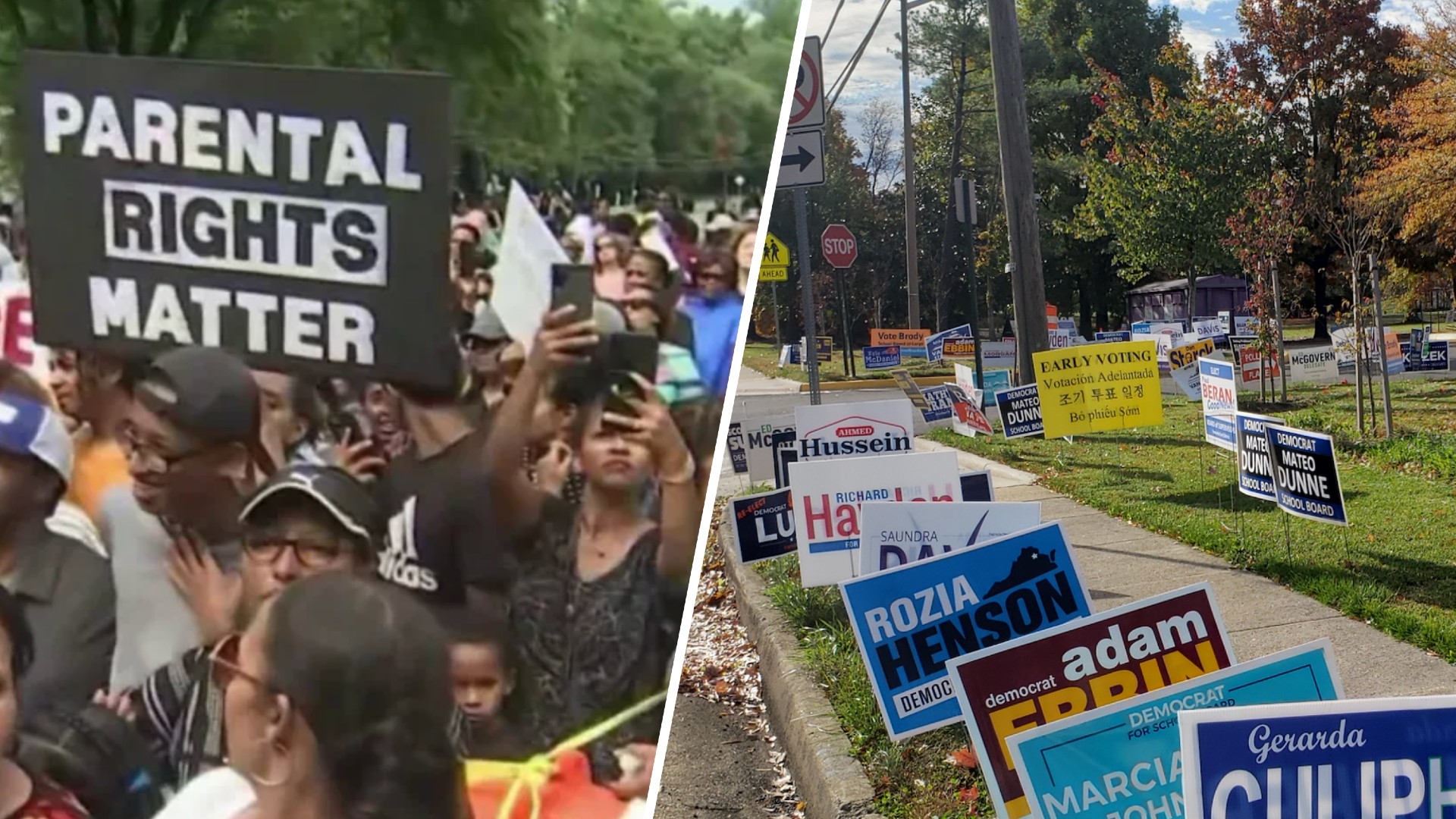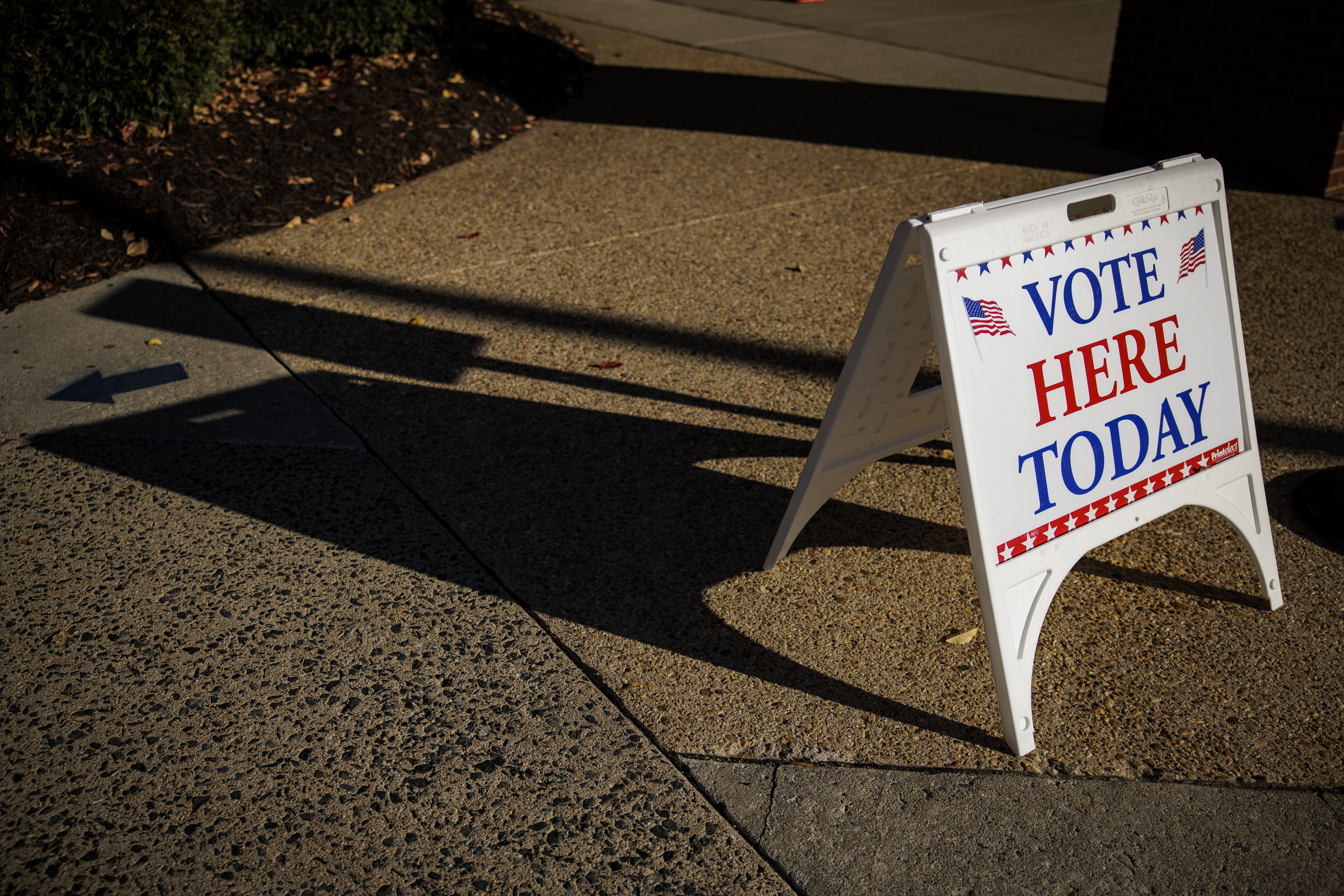News4’s Joseph Olmo reports on what Virginia voters need to know before they cast their ballots on Tuesday.
In a closing message to voters in this year's closely watched Virginia legislative elections, Republican Gov. Glenn Youngkin ticks off accomplishments from the first half of his term.
Tax cuts, law enforcement pay raises and more money for mental health services, Youngkin says in the political ad, adding that there’s so much more he wants to get done over his next two years in office.
“Elect a Republican team to back me up and I promise, we'll deliver,” Youngkin says.
Unmentioned is what Democrats warn will happen if Republicans end two years of divided government: new restrictions on abortion, a rollback of gun control laws and recently expanded voting rights, and an agenda driven by divisive social issues.
We've got the news you need to know to start your day. Sign up for the First & 4Most morning newsletter — delivered to your inbox daily. Sign up here.
Voters could make their priorities clear Tuesday when they decide whether to give the GOP full control of state government for the first time in a decade or empower Democratic legislators to continue serving as a check on Youngkin's priorities. The outcome may hinge on what Virginians think of Youngkin's proposed new limits on abortion access in the second and third trimesters of pregnancy and whether Democrats' intense focus on that issue holds sway over Republicans' pitch, largely centered on education, crime and the economy.
No topic has been more contentious than the future of abortion policy in the dozen or so districts that will likely determine the balance of power in the General Assembly. The parties' approaches are being closely watched around the country.
Virginia is one of four states — the others are Louisiana, Mississippi and New Jersey — with legislative elections this year. Virginia's off-year schedule and narrowly divided politics typically mean the state is a place to test messaging and scrutinize voter sentiment before the coming year’s presidential cycle.
It's also the only Southern state that has not put in place new restrictions on abortion since the U.S. Supreme Court in June 2022 overturned Roe v. Wade, the landmark ruling a half-century ago that provided constitutional protections for abortion.
Youngkin and Republicans in Richmond pushed unsuccessfully earlier this year for a ban on abortions after 15 weeks of pregnancy, with exceptions for rape, incest and the life of the mother. The measure was blocked by the Democratic majority in the state Senate, which has prided itself as a “brick wall” against the governor's agenda.
Youngkin wants to try again next year and says the legislation is a reasonable compromise. The state currently allows abortions through the second trimester and restricts them in the third to cases in which three doctors certify the mother’s life is at risk or her mental or physical health may be “substantially and irremediably” impaired by continuing the pregnancy.
While there's been some quiet Republican dissent about the governor's plan and a costly ad buy his political action committee made to promote it, many GOP candidates running in swing districts support his proposal.
Democrats and abortion-rights groups say the GOP plan would infringe on women's autonomy and threaten their health. While also campaigning on gun control, voting rights and environmental protections, Democrats have made their pledge to block Youngkin's proposed 15-week ban a centerpiece of their case to voters. Most Democrats say they would either protect the current law or expand abortion protections by kickstarting the multiyear process for a constitutional amendment.
Voters "know that the restriction of a right that exists today is not a compromise and it is not a consensus position. And so we continue to stand firm,” Sen. Monty Mason, a Democrat in a highly competitive Tidewater district, recently told reporters.
Republicans, including Mason's opponent, retired sheriff Danny Diggs, are highlighting pledges to tighten sentences for drug dealers and other offenders, roll back environmental mandates enacted during the previous Democratic administration and cut taxes to help families. But they also are testing a new strategy on abortion, “going on offense,” as one memo from Youngkin's PAC put it.
GOP strategists privately acknowledge they do not see abortion as a winning issue for their candidates in a state that Democrat Joe Biden won by 10 percentage points in the 2020 presidential election. But candidates have been urged by Youngkin's PAC and national anti-abortion groups to address the issue head-on.
Diggs, who said he would not vote for a bill more restrictive than the governor's proposal, acknowledged that he is hearing more from voters about the issue than he was in the spring. But he said he thinks the GOP's position is resonating: “We’re right there in the middle.”
Republicans are also hoping for a boost from a major investment in an initiative aiming to overcome GOP skepticism about early and mail voting, and get ballots banked before Election Day. An analysis by the nonpartisan Virginia Public Access Project found that six days out from the election, the share of early votes cast by likely Republican voters — Virginia doesn't have registration by party — has increased more than 2 percentage points from last year, while the GOP's share of mail votes is up by almost 4 percentage points.
“We're going to beat them at their own game,” Kay James, a former Youngkin Cabinet official who now works with his PAC, said at a rally Thursday.
In the final weeks of the election cycle, which has been marked by unprecedented spending, strategists and officials from both parties say the critical races are close.
The legislative candidates are running this year under maps redrawn during the last redistricting. The new lines gave Republicans a tougher road in retaking the Senate than holding the House, said Rich Anderson, chairman of the Republican Party of Virginia. He said he was “cautiously confident” about the possibility of a GOP trifecta — both legislative chambers as well as the governorship.
Both parties have reason to think that what's going on in Washington may affect the Virginia races.
Democrats launched an ad last week highlighting the fractious fight over picking the new speaker of the U.S. House, warning that “MAGA Republicans” were in a complete meltdown and would bring the same governing style to Richmond, referring to former President Donald Trump's “Make American Great Again” campaign slogan.
Republicans, relieved when a federal government shutdown was averted in late September, see signs of hope in Youngkin's approval ratings, which have stayed above Biden's.
Biden, who has not announced any plans to campaign in Virginia before Tuesday, recently sent a fundraising email on behalf of Virginia candidates and issued nearly two dozen endorsements.
Youngkin continues to be mentioned as a possible late entrant into the 2024 presidential race and hasn't publicly shut down the prospect. He has been crossing the state for rallies with candidates on a bus tour to promote early voting.
At an appearance Thursday in Yorktown with Diggs, Youngkin said it was time to “finish the work we started in 2021,” when he swept into office and Republicans retook the House.
“It’s time to unleash unlimited prosperity and opportunity in the Commonwealth of Virginia. It’s time for us to be that shining city on the hill where the rest of the nation says, "Yes, we can do it too,'” he said.
Democrats have framed Tuesday's stakes in similarly sweeping terms.
“This election is about state power and the direction of Virginia’s future, and we’re certain an unchecked Republican trifecta would roll Virginia’s progress back decades,” said Heather Williams, interim president of the Democratic Legislative Campaign Committee.



